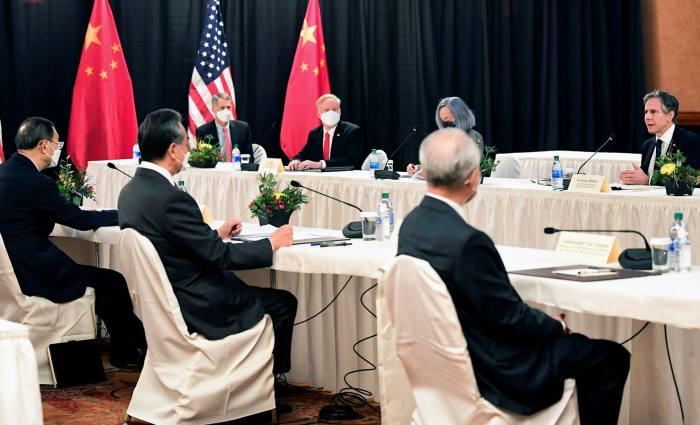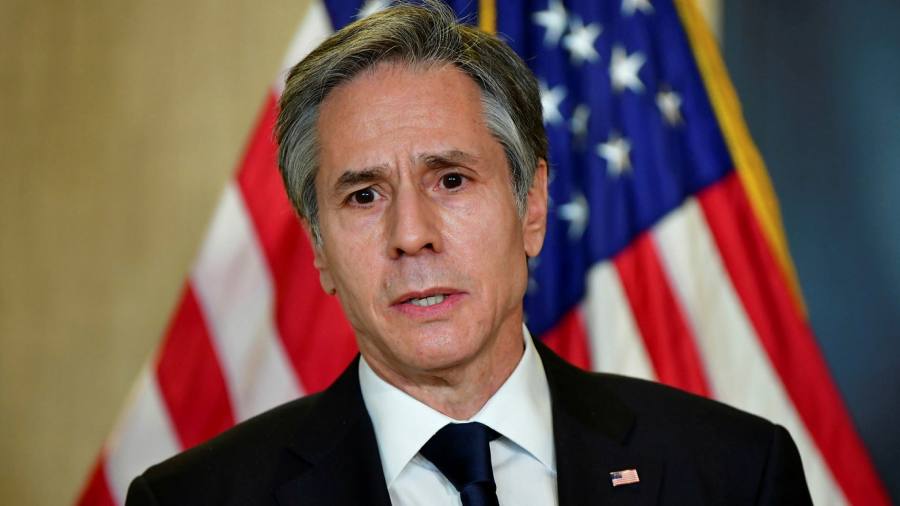[ad_1]
The US and EU are poised to reboot a joint effort on how to handle an increasingly assertive China, days after working with the UK and Canada to impose sanctions on officials over human rights abuses in Xinjiang.
Antony Blinken, US secretary of state, will relaunch the US-EU China dialogue with Josep Borrell, EU foreign policy chief, on Wednesday in Brussels, according to people familiar with the plan.
The dialogue was set up just before Donald Trump lost his bid for re-election in November but it failed to gain traction, partly because of frustration at the approach of the former president. The state department declined to comment.
The decision to renew the dialogue, which will focus on areas such as human rights and security, comes two months after the inauguration of Joe Biden as US president at a pivotal moment in Washington’s relations with Beijing.
In addition to imposing sanctions over the treatment of Uyghurs in Xinjiang on Monday, the US last week announced tough measures against Chinese and Hong Kong officials for undermining the autonomy of the financial centre. The latter decision was unveiled ahead of talks between Blinken and Jake Sullivan, the US national security adviser, and senior Chinese officials in Alaska that erupted into an extraordinary public spat.
Maaike Okano-Heijmans, an EU-Asia expert at the Clingendael Institute, a think-tank, said European governments were concerned before last week’s clash about whether they could co-operate with the US given the bipartisan hawkish consensus towards China in Washington.
“The Biden approach is different because it’s about multilateralism,†she said. “That’s positive. But Alaska struck home that the tone may be harsher than some expected. I wonder if that will make Europeans a little more worried.â€
One senior US official stressed that Blinken’s sparring with Yang Jiechi, China’s top foreign policy official, did not mean Washington would not co-operate with Beijing.
“The theatrics around the opening remarks did not reflect the civil, candid and substantive discussions that followed,†she said. “We’re clear with other nations that they shouldn’t feel the need to choose between the US and China and that we will work with China when we assess it’s in the interests of the American people.â€

The EU urged the US to work with its allies to take on China during the Trump administration. But the bloc has also tried to avoid being perceived as part of a global anti-China alliance, maintaining its 2019 policy of viewing it simultaneously as a partner, economic competitor and “systemic rival†— with the final tactic irking Beijing. China retaliated to the Xinjiang measures by imposing its own sanctions on EU institutions, lawmakers, think-tanks and academics.
All of this has complicated efforts to craft a common EU approach, which is decided by consensus among the 27 member states.
“Now that there’s a US administration that has said it really wants to work deeply [with allies] will Europe be willing to take ‘yes’ for an answer?†said Lindsay Gorman of the German Marshall Fund of the United States, a think-tank.
One person familiar with the US-EU China effort said both sides were committed to working together on issues such as standards for artificial intelligence and supply chains. He added there was no indication the Biden team would adopt the kind of “my way or the highway†approach that could make co-operation harder.
Eric Sayers of the American Enterprise Institute, a think-tank, said the US should focus on collecting wins with allies on “small but significant choicesâ€, such as human rights, supply chains and Chinese economic coercion.
“Biden . . . faces the classic Goldilocks problem with US allies on China: not too hot or not too cold,†he added. “Europeans have said they want to do more but that now means they will be forced to publicly align with the US.â€
European governments have already taken action against Beijing. Under US pressure during the Trump administration, some countries have imposed curbs on market access for Huawei, the telecoms group, and have become more vigilant about Chinese spying.
The EU is also working with the US and Japan to lobby for changes at the World Trade Organization that would target Chinese activities in areas such as industrial subsidies.
But trade is one area where EU countries’ divergent views make it more difficult to take on China. Hungary is keen to cultivate ties with Beijing and Germany, the bloc’s biggest economy, is concerned about hurting auto exports to the world’s biggest car market.
“Biden . . . is going to be pushing Europe to get on board with its tough China stance,†said Noah Barkin of the Rhodium Group, a consultancy. “This will mean some very tough choices for Brussels, Berlin and Paris. The past week has shown that walking the tightrope between Washington and Beijing is about to get much harder.â€
An EU-China investment deal agreed in December was supposed to show that relations could still be constructive. The agreement was completed despite concerns over its provisions on human and labour rights and the criticism that it handed China a diplomatic win just weeks before the inauguration of Biden, whose team were unhappy at the move.
But the travel bans China slapped on five MEPs after the Xinjiang sanctions were imposed have raised questions about whether the European parliament will approve the deal. “Trying to silence this institution can only backfire,†Bernd Lange, chair of the parliament’s trade committee which is vetting the deal, tweeted after the Chinese retaliation.
“It feels like a dam broke . . . in Brussels,†said Theresa Fallon, an expert on EU-China relations and founder of the Centre for Russia Europe Asia Studies, a think-tank. “China is driving Europe into the arms of the US.â€
Follow Demetri Sevastopulo and Michael Peel on Twitter
[ad_2]
Source link





